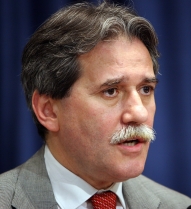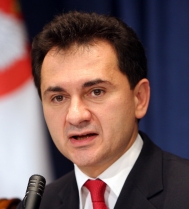Q:
A:
Initiative for new phase of negotiations on Kosovo in line with positions of several Security Council member states
Belgrade,
25 May 2007
Serbian Minister for Kosovo-Metohija Slobodan Samardzic said today that basic reasons for which the government adopted the Initiative for starting the new phase of negotiations on the status of Kosovo-Metohija is dissatisfaction with the outcome and the way the negotiations that were held from February 21, 2006 to March 10 this year were conducted.
Speaking at a press conference held after the government session, Samardzic said that the result of those negotiations is a proposal for the resolution of the status of Kosovo made by UN Special Envoy Martti Ahtisaari and his team, which Serbian parliament rejected on February 14.
He said that after that, at the negotiations conducted between February 21 and March 2, the Serbian delegation made over 500 amendments to the proposal, which speaks volumes about the Serbian position on the proposal.
Samardzic said that the government's decision to adopt the Initiative was preceded by yesterday's consultations among Serbian President Boris Tadic, Serbian Prime Minister Vojislav Kostunica and Serbian Minister of Foreign Affairs Vuk Jeremic.
The Minister said that now the moment has come for the government, ie the state, to make a concrete move and submit a formal and official initiative which is in line with the positions of a number of Security Council member states.
According to him, the resolution proposal made by the US and Germany is not going to be accepted by the Security Council because there is a great chance that Russia will veto it, and China and several other Security Council members disagree with the proposal so it is not likely that the resolution will be adopted in the Security Council any time soon.
Speaking about the time needed for the UN Secretary-General to accept the Initiative, Samardzic said that although the chances for it to be adopted are below 50%, that does not mean that the state should not carry out its duty.
He said that after that, at the negotiations conducted between February 21 and March 2, the Serbian delegation made over 500 amendments to the proposal, which speaks volumes about the Serbian position on the proposal.
Samardzic said that the government's decision to adopt the Initiative was preceded by yesterday's consultations among Serbian President Boris Tadic, Serbian Prime Minister Vojislav Kostunica and Serbian Minister of Foreign Affairs Vuk Jeremic.
The Minister said that now the moment has come for the government, ie the state, to make a concrete move and submit a formal and official initiative which is in line with the positions of a number of Security Council member states.
According to him, the resolution proposal made by the US and Germany is not going to be accepted by the Security Council because there is a great chance that Russia will veto it, and China and several other Security Council members disagree with the proposal so it is not likely that the resolution will be adopted in the Security Council any time soon.
Speaking about the time needed for the UN Secretary-General to accept the Initiative, Samardzic said that although the chances for it to be adopted are below 50%, that does not mean that the state should not carry out its duty.
Serbian Deputy Prime Minister Bozidar Djelic said that when adopting the Decree amending the Decree on interim financing of the Republic of Serbia for period January-June 2007, the government envisaged revenues in the budget of RSD 285.095 billion and expenditures of RSD 260.634 billion, which left room for a surplus of RSD 25.059 billion.
He said that expenditures are limited by the Law on the budgetary system and that they are lower by RSD 600 million than the maximum allowed by the Law.
As for the revenues, the sum of RSD 285.095 billion is more than it was originally planned, which will give more financing possibilities in the second half of the year. However, Djelic also explained that the increase in the amount of revenues comes from the collection of value added tax on imported goods, which shows that Serbia increased its exports and its foreign trade deficit also increased.
He said that this Decree will return the republic's public finances into the constitutional and legal framework and it also secures regular payment of salaries, pensions and social expenditures.
The Decree will come into force one day after its publication in the Official Herald, that is, on May 27.
This Decree covers public financing until June 30, so at consultations in Serbian parliament it was agreed that the government adopts the Bill on budget for 2007 by June 14.
Speaking about the National Investment Plan, Djelic stressed that with this Decree it will be returned in full within the framework of the budget, and the Minister in charge of its implementation coordinates and supervises its projects and funds.
Funds for the realisation of the National Investment Plan for the first six months are RSD 20.639 billion.
Also, the government set aside RSD 200 million for subsidising housing loans for the period from January-June 2007. Changes in tax laws will be made that will enable first time buyers to purchase property tax-free.
The government established appropriation of RSD 65 million for the payment of salaries for the public company for underground coal extraction Resavica, and Vesna Dzinic was appointed acting director of the Serbian Privatisation Agency.
He said that the government yesterday adopted the Bill on amendments to the Law on budgetary system which Serbian parliament will examine next week with several other laws that were adopted before, such as the Bill on amendments to the Law on government, the Bill on amendments to the Law on public administration and the Bill on civil servants.
He said that expenditures are limited by the Law on the budgetary system and that they are lower by RSD 600 million than the maximum allowed by the Law.
As for the revenues, the sum of RSD 285.095 billion is more than it was originally planned, which will give more financing possibilities in the second half of the year. However, Djelic also explained that the increase in the amount of revenues comes from the collection of value added tax on imported goods, which shows that Serbia increased its exports and its foreign trade deficit also increased.
He said that this Decree will return the republic's public finances into the constitutional and legal framework and it also secures regular payment of salaries, pensions and social expenditures.
The Decree will come into force one day after its publication in the Official Herald, that is, on May 27.
This Decree covers public financing until June 30, so at consultations in Serbian parliament it was agreed that the government adopts the Bill on budget for 2007 by June 14.
Speaking about the National Investment Plan, Djelic stressed that with this Decree it will be returned in full within the framework of the budget, and the Minister in charge of its implementation coordinates and supervises its projects and funds.
Funds for the realisation of the National Investment Plan for the first six months are RSD 20.639 billion.
Also, the government set aside RSD 200 million for subsidising housing loans for the period from January-June 2007. Changes in tax laws will be made that will enable first time buyers to purchase property tax-free.
The government established appropriation of RSD 65 million for the payment of salaries for the public company for underground coal extraction Resavica, and Vesna Dzinic was appointed acting director of the Serbian Privatisation Agency.
He said that the government yesterday adopted the Bill on amendments to the Law on budgetary system which Serbian parliament will examine next week with several other laws that were adopted before, such as the Bill on amendments to the Law on government, the Bill on amendments to the Law on public administration and the Bill on civil servants.












